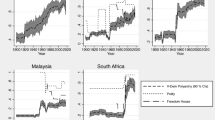Summary
In reply to H. Bußhoff's paper (this journal XII, 1981) I give another outline of Lakatos' approach to normative theories in order to reduce the misunderstandings Bußhoff seems to have fallen victim to. (1). In particular, I try to show that he is wrong in claiming there is a vicious circle in this approach or my interpretation of it (2). Finally, I expose for criticism his alternative methodology of political science which propagates a theory of a „third type“, suggesting that he takes too little seriously problems he calls academical although their importance has been shown not only by Lakatos but by political philosophers as Rawls and Nozick (3).
Similar content being viewed by others
References
Heinrich Bußhoff, Wissenschaftstheorie und politische Theorie,Zeitschrift für allgemeine Wissenschaftstheorie XII/1, 1981, S. 116–134. — Die auf Zitate folgenden Ziffern in Klammern verweisen auf die Seitenzahlen dieses Aufsatzes.
Ulrich Steinvorth, Lakatos und politische Theorie,Zeitschrift für allgemeine Wissenschaftstheorie XI/1, 1980, S. 135–146.
Diese Bestimmung orienteirt sich an Rudolf Carnap, über Protokollsätze,Erkenntnis 3, 1932/33, S. 215–228, mit dem ich Lakatos in grundsätzlicher Übereinstimmung sehe.
Vgl. Imre Lakatos, Changes in the Problem of Inductive Logic, in: Imre Lakatos, ed., The Problem of Inductive Logic, Amsterdam 1968, S. 315–417, s. bes. S. 385. Diese Auffassung vertrat übrigens schon Otto Neurath in seiner Rezension von Poppers „Logik der Forschung', S.Erkenntnis 5, 1935, 353–365 bes. Abschn. 4, und unabhängig von der Popper-Kritik schon 1913. S. O. Neurath, Gesammelte philosophische und methodologische Schriften Bd. 1, Wien 1981, S. 59.
Imre Lakatos, Die Geschichte der Wissenschaft und ihre rationalen Rekonstruktionen, in: Werner Diederich, ed., Theorien der Wissenschaftsgeschichte, Frankfurt/M. 1974, S. 55–119; S. 113 (im frühern Aufsatz habe ich irrtümlich S. 114 als Quelle genannt).
Ebd. S. 92.
Imre Lakatos, A Renaissance of Empiricism in the Recent Philosophy of Mathematics,British Journal for the Philosophy of Science 27, 1976, S. 201–223; dort Abschnitt 4 (S. 213ff); Imre Lakatos, Diskussionsbeitrag (A renaissance of empiricism in the recent philosophy of mathematics?) zu László Kalmár, Foundations of Mathematics — Whither Now, in: I. Lakatos, ed., Problems in the Philosophy of Mathematics, Amsterdam 1967, S. 187–207; hier spricht Lakatos von „potential falsifiers of mathematical theories“ S. 202.
Lakatos im Diskussionsbeitrag zu Kalmár a. a. O. S. 200f.
Ebd. S. 201f.
Nach Lakatos, Die Geschichte ... a. a. O. (Anm. 11) S. 106 stammt diese Formulierung von Michael Sukale.
Vgl. Carl G. Hempel und Paul Oppenheim, Studies in the Logic of Explanation, in: Carl G. Hempel, Aspects of Scientific Explanation, New York und London 1966, S. 245–290 (zuerst 1948).
Vgl. John Rawls, A Theory of Justice, Oxford 1971, S. 38–49, 20; Robert Nozick, Anarchy, State, and Utopia, Basic Books 1974, S. 277ff, 204f, 7ff., 220f.
Author information
Authors and Affiliations
Rights and permissions
About this article
Cite this article
Steinvorth, U. Bußhoffs Wissenschaftstheorie der Politikwissenschaft und Lakatos. Zeitschrift für Allgemeine Wissenschaftstheorie 13, 370–382 (1982). https://doi.org/10.1007/BF01801564
Issue Date:
DOI: https://doi.org/10.1007/BF01801564




